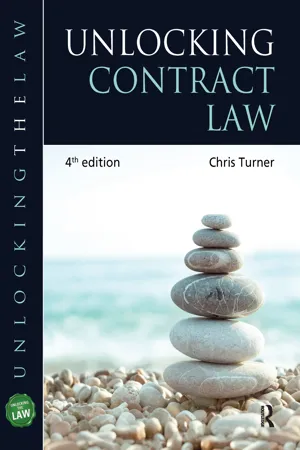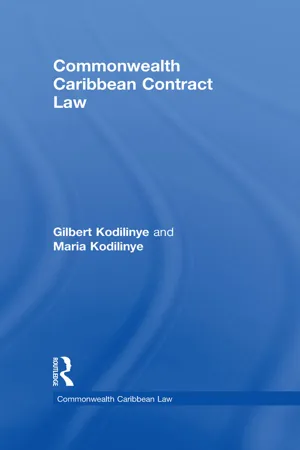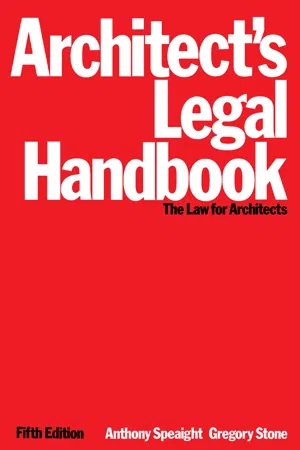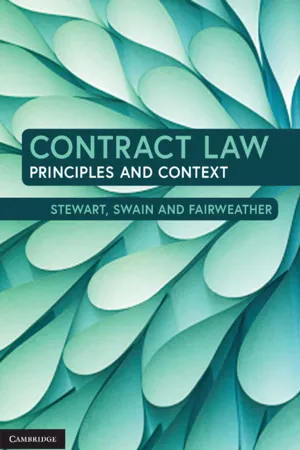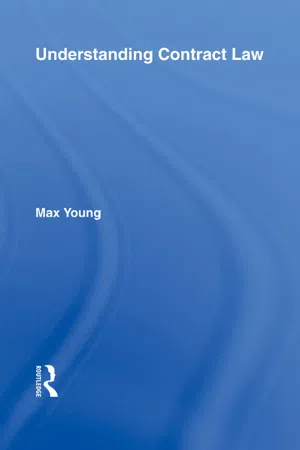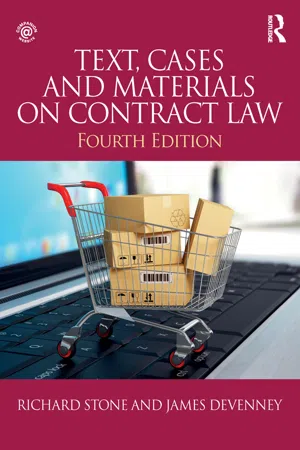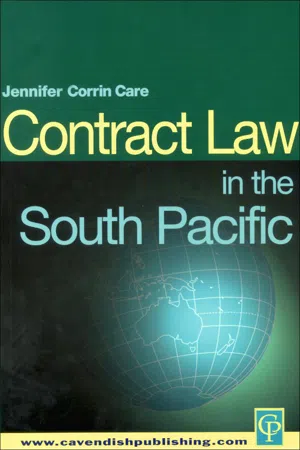Law
Express Terms
Express terms refer to the specific terms and conditions explicitly agreed upon by parties in a contract. These terms are clearly stated, whether orally or in writing, and form the basis of the contractual agreement. Express terms are crucial in determining the rights and obligations of each party and are legally binding once included in the contract.
Written by Perlego with AI-assistance
Related key terms
1 of 5
8 Key excerpts on "Express Terms"
- eBook - ePub
- Chris Turner(Author)
- 2014(Publication Date)
- Routledge(Publisher)
Quite simply, the terms of a contract are the obligations contained in it. Basically, then, a term is an expression of willingness by both parties to be bound by the obligation contained in it and if a term is breached, or not complied with, it will give the other party the right to sue.Terms can be introduced by the parties themselves or implied by other means. Express Terms are those which are agreed upon by the parties at the time the contract is formed. Since contracts can be formed in writing or orally or even by the conduct of the parties, then the terms may arise in many ways. They may form part of a written document. This in itself could be an individual expression of the agreement between the parties or indeed could be a standard method of contracting by a particular party, as in ‘standard forms’. In contrast, they may be nothing more than a simple oral promise. They may arise after a single, simple agreement or after long, protracted negotiations. They may be critical to the performance of the contract or they may be purely descriptive. What they all have in common is that the parties themselves have agreed on them and they are all subject to some form of legal action if they are breached.6.2.2 The process of incorporating Express TermsClearly, the dividing lines between some of the categories of statements in section 6.1.2 above are not always obvious. Where a contract is in writing then the process of distinguishing is generally simpler. The terms are as stated in the written contract. Where, however, negotiations leading up to the contract are oral, the courts have developed guidelines to determine whether a particular statement is a term of the contract or not.In order to be a term of the contract, the statement must be incorporated and form part of the contract. Inevitably, since different parties may take a different view of the importance of particular pre-contractual statements, the courts have been called on to devise tests to determine whether or not a particular statement is incorporated as a term. In general, the courts adopt an objective analysis, basing their decision on what a reasonable man would consider was in the mind of the parties at the time they formed the contract. - eBook - ePub
- Gilbert Kodilinye, Maria Kodilinye(Authors)
- 2013(Publication Date)
- Routledge(Publisher)
Chapter 6 TermsDOI: 10.4324/9780203488645-6Contractual Terms
The terms of a contract are its contents, and they define the rights and obligations arising from the contract. Contractual terms may be express or implied.Express Terms are those specifically laid down by the contract, and they consist of express oral or written statements made by the parties.Implied terms are those which are not specified in the contract but which are implied either (i) by statute, or (ii) by custom, or (iii) by the court.Express Terms
A contract may be (i) purely written, (ii) purely oral, or (iii) partly written and partly oral. Generally, no formality is required for a term, whether oral or in writing (or partly orally or partly in writing), to form part of a contract. If the terms of a contract are in dispute, a court will determine what terms were decided on by the parties. The object of the court in this exercise is to do justice to the parties, and the court should not be ‘deterred by difficulties of interpretation, as difficulty is not synonymous with ambiguity’.1 This is a question of fact, and, in respect of oral contracts, precise evidence may be required in order to clarify exactly what the terms of the agreement were, as the dispute may turn on very fine details.21 Hardman v MeisterBS 1993 SC 64.2 For example, in Smith v Hughes (1871) LR 6 QB 597, the dispute centred on whether goods were described as ‘good oats’ or ‘good old oats’;.Proof of Terms
Oral contracts
Terms and representations
Statements made by parties can be categorised as (1) promises or (2) mere representations. Except in the case of the simplest transactions, there will generally be a period of negotiation before the final terms of the contract are agreed. Promises (sometimes called ‘warranties’) made during negotiations and not withdrawn will form part of an oral contract and are therefore binding. An action for damages will lie for breach of these terms.3 - eBook - PDF
- Paul Bates(Author)
- 2021(Publication Date)
- Goodfellow Publishers(Publisher)
4 The law of contract: Contracts in practice Terms The terms within a contract form the rules that both parties agree to comply with in their contractual dealings with each other. In a written contract, these terms are very easy to recognise simply because you can read them. These are examples of Express Terms . As we will see, there may well be other terms in a contract which legally exist but they are implied into the contract by law. These are implied terms and no matter how hard you try to find them in a written contract you’ll never discover them. Terms, both express and implied, can exist in both written and verbal contracts. Some of the terms in a contract are legally more important than others. Unfortunately for us, we can’t always tell before a case is heard in a court which are the most important terms and which are of less importance. So, if there’s been some legal dispute, we have to wait for the court’s decision to find out whether a term is very important or not – bear with me here and all will be explained. Express and implied terms Imagine that you agree to sell your car to a friend and you describe the type of car, its price and probably the registration number, colour and mileage. Assuming your friend agrees to your offer (accepts it) then whether you write down the above description and price etc. or whether this is done verbally, the details of the car as you’ve described it, are Express Terms which you’re both agreeing to. One implied term in the contract, which you both probably won’t even think of, is that you have the right to sell the car. That is, you actually own the car in the first place! This shows you how these implied terms tend to be a bit sneaky. They aren’t always obvious and can creep up on you while your back is turned. - eBook - PDF
Architect's Legal Handbook
The Law for Architects
- Anthony Speaight, Gregory Stone(Authors)
- 2014(Publication Date)
- Butterworth-Heinemann(Publisher)
6.17 This topic leads on naturally to the next. Once it is established that a contract exists, what are its terms? 7 Terms of a contract Express Terms 7.01 The most obvious terms of a contract are those which the parties expressly agreed. In cases where there is an oral contract there may be conflicting evidence as to what actually was said and agreed, but with the written contracts with which architects will most often deal, construing the Express Terms is usually less problematic: just read the document evidencing the contract. The 'four corners rule' restricts attention to within the four corners of the document, and even if the written terms mis-state the intention of one of the parties -perhaps that party had not read the document carefully before signing it - he will be bound by what is recorded save in exceptional circumstances. This is another manifestation of the objective approach of English contract law discussed above. 7.02 It should be noted at this stage that things said or written prior to making a contract may affect the parties' legal obligations to one another even though they are not terms of the contract. This matter is discussed in the section on misrepresentation. Implied terms 7.03 Implied terms are likely to catch out the unwary. There are three types of implied term: those implied by statute, those implied by custom, and those implied by the court. Terms implied by the court 7.04 With unfortunate frequency constracting parties dis-cover too late that their contract has failed to provide for the events which have happened. One party will wish that the contract had included a term imposing liability on the other in the circumstances that have turned out, and will try to persuade the court that such a term in his favour should be implied into the contract, saying, in effect, that the court 12 The English Law of Contract ought to read between the lines of the contract and find the term there. - eBook - PDF
Contract Law
Principles and Context
- Andrew Stewart, Warren Swain, Karen Fairweather(Authors)
- 2019(Publication Date)
- Cambridge University Press(Publisher)
PART III CONTRACTUAL OBLIGATIONS 153 III 9 TERMS AND OBLIGATIONS 155 Introduction 9.01 The different types of contractual term A term of a contract is a provision or identifiable component that sets out what the parties are to do or how their agreement is to operate. There are many different ways in which contractual terms can be categorised. One of the most important distinctions is between express and implied terms. An express term is generally understood as one that has explicitly been identified by the parties, whether verbally or in writing, or the existence of which can otherwise be inferred from their conduct. In this chapter, we explore two common issues that can arise with such terms. The first is whether and how a set of written terms prepared by one party can be said to be incorporated or included in a contract. The second concerns the status of statements or assurances made before the parties have reached agreement. An implied term is a provision on which the parties have not actually agreed, but which is nonetheless taken to be part of their contract. There are at least four different types of implied term, those which are implied: (1) in fact, or on an ad hoc basis; (2) by custom and practice; (3) by law (that is, the common law); or (4) by statute. 1 More is said about each of these categories later in the chapter. For now, it is sufficient to note that the first two rest on the notion of presumed agreement. They involve identifying a provision that the parties are taken to have wanted to be part of their agreement, even though they have not said as much. The third and fourth, by contrast, involve a term being imposed on the parties by the operation of a legal rule. But it is important not to exaggerate these distinctions. Terms implied by law, like those implied in fact or by custom and practice, can only take effect if they are consistent with what the parties have expressly agreed. The same is true for at least some terms implied by statute. - eBook - ePub
- Max Young(Author)
- 2009(Publication Date)
- Routledge(Publisher)
I reach that conclusion … it tends towards certainty in the law. One of the essential elements of law is some measure of uniformity. One of the important elements of the law is predictability. At any rate in commercial law, there are obvious and substantial advantages in having, where possible, a firm and definite rule for a particular class of legal relationship, eg as here, the legal categorisation of a particular, definable type of contractual clause in common use. It is surely much better, both for shipowners and charterers (and, incidentally, for their advisers) when a contractual obligation of this nature is under consideration, and still more when they are faced with the necessity for an urgent decision as to the effects of a suspected breach of it, to be able to say categorically: ‘If a breach is proved, then the charterer can put an end to the contract’, rather than that they should be left to ponder whether or not the courts would be likely, in the particular case, when the evidence had been heard, to decide that in the particular circumstances the breach was or was not such as to go to the root of the contract. Where justice does not require greater flexibility, there is everything to be said for, and nothing against, a degree of rigidity in legal principle.9.5 Implied termsIn addition to the terms expressly agreed between the parties there are sometimes terms implied into the contract. In such cases, therefore, in order to determine what the exact contract (agreement) is between the parties the Express Terms AND the implied terms must be taken together : together they constitute the one contract between the parties.NB Terms can be implied into a contract by custom, statute or by the court.9.5.1 Terms implied by customIn many ‘trades’ or areas of business there are to be found customs of various sorts. These customs can include ‘legal’ customs which have the effect of implying terms into a contract. To imply a term into such a contract the custom must be ‘notorious, certain, legal and reasonable’. - eBook - PDF
- Richard Stone, James Devenney(Authors)
- 2017(Publication Date)
- Routledge(Publisher)
Such a term will provide greater certainty than leaving it to the court to determine the consequences of breach. Note also the Consumer Rights Act 2015 which specifies some of the consequences of breach of particular statutory rights. The Government’s intention was to “[s]et out more clearly the standards that the goods must meet. This will remove references to “conditions”, “warranties” and “implied terms” and replace these with less legalistic language’ ( Draft Consumer Rights Bill: Government Response to Consultations on Consumer Rights , June 2013 (BIS/13/916) at p 26). 6.4 Implied terms It would be unrealistic to expect every term in a contract to be written down or expressed in words. Indeed, if they were, contracts would be absurdly lengthy documents. Therefore, in certain situa-tions a term or terms may be implied into a contract. Parliament has intervened to imply terms into certain types of contract, for example: contracts for the sale and supply of goods, employment contracts and contracts between a landlord and tenant. In the absence of intervention by Parliament, it is left to the courts to imply terms. The relationship between express and implied terms was con-sidered by Lord Diplock in Photo Production v Securicor Transport [1980] AC 827: A basic principle of the common law of contract . . . is that parties to a contract are free to determine for themselves what primary obligations they will accept. They may state these in express words in the contract itself, and, where they do, the statement is determinative; but in practice a commercial contract never states all the primary obligations of the parties in full; many are left to be incorporated by implication of law from the legal nature of the contract into which the parties are entering. But if the parties wish to reject or modify primary obligations which would otherwise be so incorporated, they are fully at liberty to do so by express words. - eBook - ePub
- Jennifer Corrin-Care(Author)
- 2015(Publication Date)
- Routledge-Cavendish(Publisher)
CHAPTER 8 TERMSINTRODUCTION
This chapter is concerned with the problems that arise in determining the binding terms of an agreement. Where terms are in dispute, the courts must look at all the circumstances to determine what was agreed. The test is objective. Thus, in deciding the terms of agreement between the parties in Sun Islands Inc υ Fewtrell,1 Webster J said:The intention of the parties is, as a general rule, to be construed objectively. The language used by one party, whatever his real intention may be, is to be construed in the sense in which it would be reasonably understood by the other, or at least in the sense in which a reasonable person would construe it.The court will examine any written documents and also, subject to rules of evidence, look at what the parties said and did. From this evidence, the court will determine the terms which are binding in law upon the parties.This chapter examines ‘promissory terms’. These terms set out the parties’ undertaking to perform their part of the bargain and the details surrounding that undertaking, such as how the performance will take place. Promissory terms may be either express or implied. Express Terms may be either oral or written or may even be based on conduct of a party. Implied terms may arise from oral or written statements or from the conduct of the parties. As discussed later in this chapter, implied terms may also arise from extrinsic sources.Express Terms
Terms or representations
Promissory terms need not be written. Subject to statutory provisions, discussed in Chapter 9 , the whole contract may consist of oral statements. The contract may also be partly oral and partly in writing or may arise wholly or in part from conduct.Some statements made in the course of negotiations do not form part of the contract. Such statements are often oral, but may also be in written form. These statements may be representations or, as discussed in the context of the offer, they may be mere puff.2
Index pages curate the most relevant extracts from our library of academic textbooks. They’ve been created using an in-house natural language model (NLM), each adding context and meaning to key research topics.
